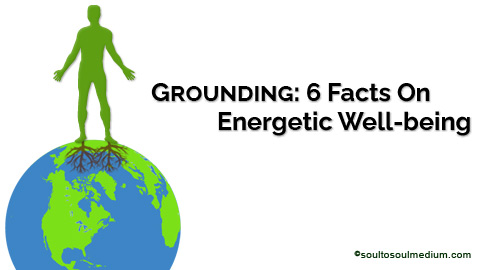Grounding: 6 Facts On Energetic Well-being 
1. What Is Grounding
Grounding is a simple yet powerful technique that helps us connect with the Earth's energy and maintain our energetic balance. Think of it as anchoring yourself to the present moment. By grounding, we can reduce stress, enhance focus, and protect ourselves from negative energy.
2. Why is Grounding Important?

- Shielding Negative Energy: Grounding acts as a shield, preventing us from absorbing unwanted emotions or energies from others.
- Grounding Brings Us To The Here & Now: When we are grounded, our attention is anchored in the present moment. This allows us to experience life more fully, reduce stress, and enhance our overall well-being.
- Boosting Focus and Concentration: A grounded mind is a focused mind. Grounding techniques can help improve your ability to concentrate and stay on task.
- Reducing Stress and Anxiety: By connecting with the here and now and the Earth's energy, we can calm our nervous system and reduce feelings of stress and anxiety.
- Enhancing Spiritual Awareness: Grounding allows us to be more present and receptive to spiritual insights and guidance.
3. What Can Cause One To Become Un-Grounded?
 Empaths and highly sensitive individuals often find themselves easily overwhelmed by the energy around them. This can leave them feeling drained and ungrounded or feeling beside themselves. Similarly, scholars and deep thinkers can get lost in their thoughts, disconnecting from the physical world.
Empaths and highly sensitive individuals often find themselves easily overwhelmed by the energy around them. This can leave them feeling drained and ungrounded or feeling beside themselves. Similarly, scholars and deep thinkers can get lost in their thoughts, disconnecting from the physical world.
Life's ups and downs can also throw us off balance. Whether it's a major life event, a strong emotional reaction, or simply a moment of intense joy, these experiences can temporarily disconnect us from the present moment.
4. Signs You Might Need to Ground Yourself
When we're ungrounded, it can feel like we're adrift, lost in a fog. We may struggle to concentrate, follow conversations, or even stay present in the moment. Daydreaming, feeling disconnected, and unexplained irritability are common signs. Plus, being ungrounded can leave us vulnerable to absorbing negative energy from others, which can further affect our mood.
5. Common Ways to Ground Yourself:
- Connect with Nature: Spend time outdoors, walk barefoot on the grass, or simply sit by a tree.
- Mindful Breathing: Focus on your breath, inhaling deeply and exhaling slowly.
- Grounding Meditation: Visualize roots growing from your feet, anchoring you to the Earth.
- Physical Activity: Engage in activities like yoga, tai chi, or dancing to release tension and connect with your body.
- Sensory Grounding: Use your senses to ground yourself. Pay attention to the sights, sounds, smells, tastes, and textures around you.
6. Empaths, Anxiety, and the Power of Grounding
Empaths, individuals with heightened sensitivity to the emotions of others, often find themselves susceptible to anxiety. This heightened emotional awareness can be both a blessing and a challenge, as it can lead to overwhelming feelings of stress and unease. Fortunately, the practice of grounding can be a powerful tool for empaths to manage their anxiety and maintain emotional well-being.
 Incorporating Grounding into Your Daily Life
Incorporating Grounding into Your Daily Life
By incorporating grounding techniques into your daily life, you can enhance your overall well-being, reduce stress, and improve your ability to focus. Remember, grounding is a simple yet powerful tool that can be used to navigate life's challenges and cultivate a greater sense of peace and balance. So, take a moment each day to connect with the Earth and yourself.
I hope you have enjoyed this article and will enjoy this one "How To Ground In Easy Steps.





